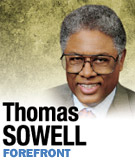Subscriber Benefit
As a subscriber you can listen to articles at work, in the car, or while you work out. Subscribe Now
 This may be the golden age of presumptuous ignorance. The most recent demonstrations of that are the Occupy Wall Street mobs. It is doubtful how many of these semi-literate sloganizers could tell the difference between a stock and a bond.
This may be the golden age of presumptuous ignorance. The most recent demonstrations of that are the Occupy Wall Street mobs. It is doubtful how many of these semi-literate sloganizers could tell the difference between a stock and a bond.
Yet there they are, mouthing off about Wall Street on television, cheered on by politicians and the media. If this is not a golden age of presumptuous ignorance, perhaps it should be called a brass age.
No one has more brass than the president of the United States, though his brass may be more polished than that of the Occupy Wall Street mobs. When Barack Obama speaks loftily about “investing in the industries of the future,” does anyone ask: What in the world would qualify him to know what are the industries of the future?
Why would people who have spent their careers in politics know more about investing than people who have spent their careers as investors?
Presumptuous ignorance is not confined to politicians or rowdy political activists, by any means. From time to time, I get a huffy letter or e-mail from a reader who begins, “You obviously don’t know what you are talking about … “
The particular subject may be one on which my research assistants and I have amassed piles of research material and official statistics. It may even be a subject on which I have written a few books, but somehow the presumptuously ignorant just know that I didn’t really study that issue, because my conclusions don’t agree with theirs or with what they have heard.
A recent column that mentioned the “indirect subsidies” from the government to the Postal Service brought the presumptuously ignorant out in force, fighting mad.
Because the government does not directly subsidize the current operating expenses of the Postal Service, that is supposed to show that the Postal Service pays its own way and costs the taxpayers nothing.
Politicians may be crooks but they are not fools. Easily observed direct subsidies can create a political problem. Far better to set up an arrangement that will allow government-sponsored enterprises—whether the Postal Service, Fannie Mae, Freddie Mac or the Tennessee Valley Authority—to operate in such a way that they can claim to be self-supporting and not costing the taxpayers anything, no matter how much indirect subsidy they get.
As just one example, the Postal Service has a multi-billion-dollar line of credit at the U.S. Department of the Treasury. Hey, we could all use a few billion every now and then to get us over the rough spots. But we are not the Postal Service.
Theoretically, the Postal Service is going to pay it all back some day, and that theoretical possibility keeps it from being called a direct subsidy. The Postal Service is also exempt from paying taxes, among other exemptions it has from costs that other businesses have to pay.
Exemption from taxes, and from other requirements that apply to other businesses, are also not called subsidies. For people who mistake words for realities, that is enough for them to buy the political line—and to get huffy with those who don’t.
Loan guarantees are a favorite form of hidden subsidies for all sorts of special interests. At a given point in time, it can be said that these guarantees cost the taxpayers nothing. But when they suddenly do cost something—as with Fannie Mae and Freddie Mac—they can cost billions.
One of the reasons for so much presumptuous ignorance flourishing in our time may be the emphasis on “self-esteem” in our schools and colleges. Children not yet a decade old have been encouraged, or even required, to write letters to public figures, sounding off on issues ranging from taxes to nuclear missiles.
Our schools begin promoting presumptuous ignorance early on. It is apparently one of the few things they teach well. The end result is people without much knowledge, but with a lot of brass.•
__________
Sowell is a senior fellow at the Hoover Institution. Send comments on this column to [email protected].
Please enable JavaScript to view this content.
